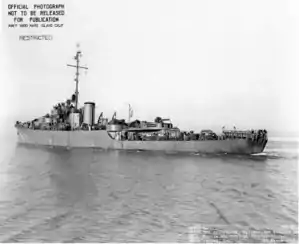 USS Pocatello (PF-9) | |
| History | |
|---|---|
| Name | Pocatello |
| Namesake | City of Pocatello, Idaho |
| Reclassified | Patrol Frigate (PF), 15 April 1943 |
| Ordered | as a Type S2-S2-AQ1 hull, MCE hull 1427[1] |
| Builder | Permanente Metals Richmond Shipyard #4, Richmond, California |
| Yard number | 52[1] |
| Laid down | 17 August 1943 |
| Launched | 17 October 1943 |
| Commissioned | 18 February 1944 |
| Decommissioned | 2 May 1946 |
| Stricken | 5 June 1947 |
| Identification |
|
| Fate | Sold for scrap, September 1947 |
| General characteristics [2] | |
| Class and type | Tacoma-class frigate patrol frigate |
| Displacement | |
| Length | 303 ft 11 in (92.63 m) |
| Beam | 37 ft 6 in (11.43 m) |
| Draft | 13 ft 8 in (4.17 m) |
| Installed power | |
| Propulsion |
|
| Speed | 20.3 kn (37.6 km/h; 23.4 mph) |
| Complement | 190 |
| Armament |
|
USS Pocatello (PG-117/PF-9), a Tacoma-class patrol frigate, was the only ship of the United States Navy to be named for Pocatello, Idaho.
Construction and commissioning
Pocatello, originally classified as patrol gunboat, PG-117, was reclassified as a patrol frigate, PF-9, on 15 April 1943. She was laid down on 17 August 1943, under a Maritime Commission (MARCOM) contract, MC hull 1427, at the Permanente Metals Richmond Shipyard #4, Richmond, California.[2] Pocatello was launched on 17 October 1943, sponsored by Miss Thelma Dixey, a great-granddaughter of Chief Pocatello; manned by a Coast Guard crew; and commissioned on 18 February 1944.[3]
Service history
After fitting out at General Engineering and Drydock Company, in Alameda, California, and shakedown out of San Diego, through 28 April, Pocatello was assigned to Commander, Western Sea Frontier, and directed to commence weather station operations out of Seattle, Washington. Departing San Francisco, on 17 May, she arrived at Seattle, on 22 June. One month later she commenced her first patrol on Weather Station Able.[3]
The actor Buddy Ebsen served aboard Pocatello. He applied for a commission in the US Navy but was turned down; even though he was teaching seamanship to Naval Reserve OCS candidate at the time. He then applied for and received a commission as a Lieutenant (junior grade) in the US Coast Guard. He was assigned to Pocatello and served on her from February 1944 until 16 October 1945.[4]
Pocatello's weather station was approximately 1,500 miles (1,300 nmi; 2,400 km) west of Seattle. Patrols consisted of thirty days at sea followed by ten days in port at Seattle. Pocatello alternated on station with the Coast Guard cutter Haida (WPG-45), and had completed a dozen patrols by the war's end. Pocatello was then laid up on the west coast. Scheduled for disposal, she shifted to Charleston, South Carolina, arriving there on 6 April 1946, and decommissioning there on 2 May. Pocatello was subsequently sold at Charleston, in September 1947, to J. C. Berkwit and Company of New York City.[3][2]
References
Bibliography
- "Pocatello". Dictionary of American Naval Fighting Ships. Naval History and Heritage Command. 24 August 2015. Retrieved 13 November 2018.
 This article incorporates text from this source, which is in the public domain.
This article incorporates text from this source, which is in the public domain. - "Kaiser Permanente No. 4, Richmond CA". ShipbuildingHistory.com. 5 February 2014. Retrieved 9 November 2018.
- "Pocatello (PF 9)". Navsource.org. Retrieved 13 November 2018.
- "Ebsen, Christian Rudolph, Jr., LT". Togetherweserved.com. Retrieved 13 November 2018.
External links
- Photo gallery of USS Pocatello at NavSource Naval History
- hazegray.org: USS Pocatello